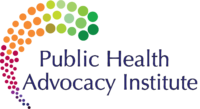By Cara Wilking, JD, Consulting Attorney
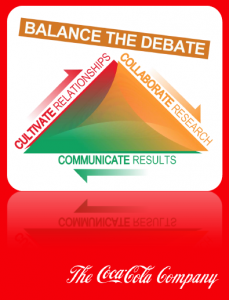
The Coca-Cola Company’s pouring of millions of dollars into the Global Energy Balance Network (GEBN), a front group focused on exercise as opposed to diet to combat obesity, has crystallized an issue that the public health community has long been concerned about: the role of industry funding to research and develop solutions to public health threats. A New York Times story exposing this funding arrangement has led to a public relations nightmare that finally culminated in a formal statement from Coke’s Chairman and CEO, Muhtar Kent. Mr. Kent stated that the accusation that the company is deceiving the public about its support for scientific research “does not reflect our intent or our values,” and promised more transparency. He promised to make available a list of the funding it supports, and to convene expert panels to assist with future “investments in academic research.”
Coke’s funding of GEBN is part of a well-articulated company strategy it calls “Balancing the Debate.” Coca-Cola’s chief scientific officer, Rhona S. Applebaum , PhD, laid out the Balancing the Debate strategy at a 2012 conference for the sugar industry. (CLICK HERE FOR THE FULL PRESENTATION) The strategy seeks to discredit what the company calls “detractors” in the scientific community like Kelly Brownell, Dean of the Sanford School of Public Policy at Duke University (formerly of Yale University), and public health organizations like Center for Science in the Public Interest.
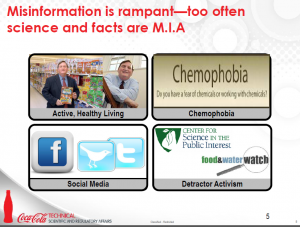
At that 2012 industry conference, Ms. Applebaum told participants that she had come with a “plea from Coca-Cola” that “we all have to work together and use science.”
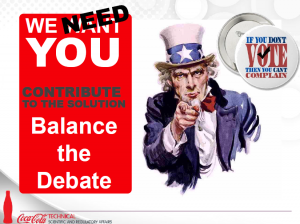
To that end, Ms. Applebaum, shared Coke’s strategy to “Balance the Debate” by using three interdependent steps: “Cultivate Relationships,” “Collaborate Research,” and “Communicate Results.” These steps, if properly taken, will result in a balanced debate that will “Address the Negative” and “Advance the Positive” for the food industry.
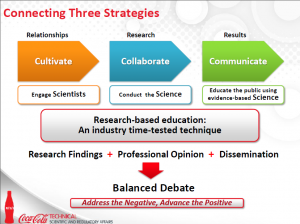
Ms. Applebaum, was clear that cultivating relationships and research collaborations comes down to dollars and cents. She outlined how to use research funding for “defensive and offensive science and research” to address the issues faced by the food industry.
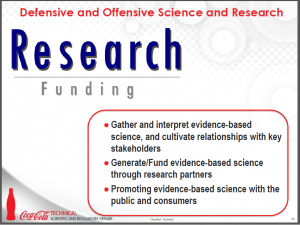
The GEBN seems to have been tailor-made for the offensive and defensive research Coke had in mind, and it amplifies and expands the mission and capabilities of Coke’s Beverage Institute for Health and Wellness, which is run by Ms. Applebaum. On a slide entitled “What Experts Tell Us,” Ms. Applebaum gave insight into the company’s research agenda to “Shift energy balance,” “Inspire/Motivate consumer behavior change,” and “Bring opportunities (on energy in/out).”
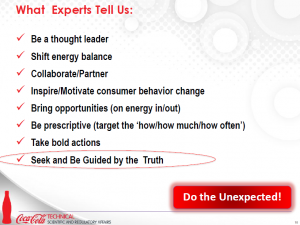
To add a gloss of legitimacy to Coke’s vision for funding science to serve its agenda, its chief scientific officer, Ms. Applebaum, co-authored two papers: one in 2009 with guiding principles for industry funding of food science and nutrition research, and one in 2012 with guiding principles for establishing panels of scientific advisers. With respect to funding food science and nutrition research like that conducted by GEBN, Ms. Applebaum co-wrote the following guiding principles:
In the conduct of public/private research relationships, all relevant parties shall:
1) conduct or sponsor research that is factual, transparent, and designed objectively; according to accepted principles of scientific inquiry, the research design will generate an appropriately phrased hypothesis and the research will answer the appropriate questions, rather than favor a particular outcome;
2) require control of both study design and research itself to remain with scientific investigators;
3) not offer or accept remuneration geared to the outcome of a research project;
4) prior to the commencement of studies, ensure that there is a written agreement that the investigative team has the freedom and obligation to attempt to publish the findings within some specified time frame;
5) require, in publications and conference presentations, fully signed disclosure of all financial interests;
6) not participate in undisclosed paid authorship arrangements in industry-sponsored publications or presentations;
7) guarantee accessibility to all data and control of statistical analysis by investigators and appropriate auditors/reviewers; and
8) require that academic researchers, when they work in contract research organizations or act as contract researchers, make clear statements of their affiliation; require that such researchers publish only under the auspices of the contract research organizations. (emphasis added).
These guiding principles clearly were not adequately followed in the case of Coke’s funding of the GEBN, and it remains to be seen what other research it has been cultivating as part of its effort to “balance the debate.” Moreover, the whole concept of funding “defensive and offensive science and research” is completely at odds with the principles of objective research design contained in the guiding principles.
Coke has had a concerted effort to fund science in its favor pursuant to a specific plan laid out by its chief scientist in 2012, and it failed to adequately follow the ethical guidelines its chief scientist helped to write in 2009. The remedies CEO Kent now promises are to disclose who the company has funded (something, according to their chief scientist, the company should have already been doing), and enlisting more experts to help sort things out. For Coke’s CEO to say that the criticism of actions that were clearly in line with a well-articulated Coca-Cola Company strategic plan and failed to comply with basic ethical principles co-written by its chief scientific officer “does not reflect” the company’s “intent” or “values” is partly right and partly wrong. It clearly reflects Coke’s intent to fund science to serve its interests. It does not, however, reflect the purported values of the company with respect to working with scientific researchers.Post navigation
